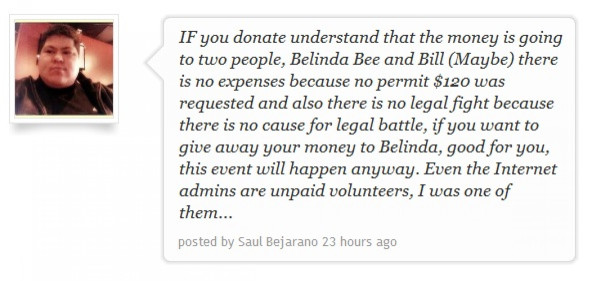GoFundMe And Accountability: Lax Crowdfunding Site Wants Loose Rules And Big Campaigns: Can It Have Both?

Ever since the concept of crowd-funding first entered the mass-consciousness a few years ago, the notion of accountability has been at the forefront of the conversation. Recent stories about crowd-funding scams on PandoDaily, MSN Money and elsewhere have underscored the fears of naysayers who have said, from the beginning, that crowd-funding is simply too susceptible to those who would take advantage of people’s good nature. This fear is perhaps most prominent in GoFundMe, a kind of anti-Kickstarter crowd-funding site whose entire ethos is built around staying out of your way.
Unlike Kickstarter, which is both famous and infamous for its stringent rules and all-or-nothing ethos, the San Diego-based GoFundMe is loose on guidelines and even looser on quality assurance. There are no rigid rules about creative projects or campaigns needing to have a clear goal. On GoFundMe, you can solicit donations for almost any reason. Do you need money to send a teenager to Disney World or buy Gwen a birthday bike? No problem. Even better, you get the cash whether you meet your goal or not -- minus a 5 percent take from GoFundMe and additional processing fees.
The appeal of a crowd-funding website that lets users engage in hassle-free fundraising is obvious. But what’s equally obvious is the question of whether GoFundMe’s rules are too lax for users’ own good. Given that anyone can ask money for anything, can any campaign really be trusted? Sure, it’s a nice idea to raise $5,000 so Autumn can run for the Mrs. Idaho Pageant, but how do we know Autumn won’t take that money and blow it on a wild weekend in Boise with her BFFs?
International Business Times reached out to GoFundMe to ask what types of safeguards are in place to ensure that campaigns are authentic. The short answer is not many, but in that respect GoFundMe is not fundamentally different than larger crowd-funding platforms such as Indiegogo and Kickstarter, neither of which guarantees the authenticity of their campaigns. Doing so would simply not be feasible.
As such, it’s the user’s responsibility to be discerning when deciding which campaigns are worthy of their hard-earned cash. That’s true of all crowd-funding platforms. But where GoFundMe differs is in how it advises those users. In an email to IBTimes, Morgan Wood of GoFundMe “customer happiness” repeated its curiously parental policy of urging its users not to donate to strangers.
“[W]e must insist that visitors follow the advice stated on each and every campaign,” Wood said. “Only donate to people you personally know and trust.”
Here, GoFundMe is at odds not only with Kickstarter and Indiegogo but also with the very tenets of crowd-funding itself. After all, isn’t the whole purpose to solicit the crowd, to maximize your fundraising efforts by expanding beyond your immediate circle? Neither Wood nor Brad Damphousse, GoFundMe’s chief executive, responded to repeated requests for clarification.
Granted, campaigns on GoFundMe tend to be smaller and many campaign creators have probably not expanded beyond people they know. (The Mrs. Idaho hopeful, for instance, has only 20 backers so far.) But larger campaigns clearly get outside help, and it’s here that the question of accountability becomes more salient. Consider the group “2 Million Bikers to DC,” which, to date, has raised more than $33,000 from 751 backers on GoFundMe. The organizers initially launched the campaign to fund a group motorcycle ride from Maryland to Washington, an event IBTimes reported on this week.

But some people are questioning the organizers’ motivations. One reader contacted IBTimes via email and pointed out that “2 Million Bikers” is not a nonprofit organization or even an official organization of any kind. The reader also noted that some commenters on the campaign page have been expressing concern about where all that money is going. Could a group motorcycle ride on free highways really cost north of 30 grand?
Belinda Bee and Bill Williamson, the group’s founders, did not respond to repeated requests for more information. Although the campaign page makes a reference to a legal fight over obtaining a permit, it lists no specific expenses associated with the event -- information typically included on Kickstarter and Indiegogo campaigns. Bee and Williamson do say that they plan to donate additional proceeds to a 9/11 first responder, but our reader, at least, was skeptical.
“I tend to think the two involved are taking advantage of potentially well-meaning bikers while exploiting one of the most tragic days in American history,” the reader wrote.
Crowd-funding, like everything else in life, is a relative term. The various rules and parameters of Kickstarter are often criticized for being too restrictive, and that criticism is probably deserved to some extent. But if Kickstarter occupies one extreme end of the crowd-funding spectrum, GoFundMe resides on the other. A world no rules has both its pluses and minuses, and there’s no doubt it can be both entertaining and inspiring -- as many GoFundMe success stories are. But it’s hard not to think about those minuses when your wallet enters the picture. For now, maybe the whole “donate to people you know” thing isn’t such bad advice.
© Copyright IBTimes 2025. All rights reserved.






















